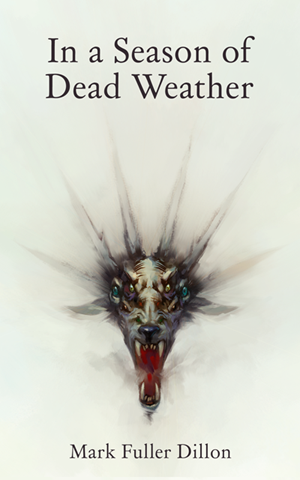 Originally posted at the New Podler Review of Books.
Originally posted at the New Podler Review of Books.
Grab a comfy chair by the fire, a hot drink, and a book of good horror stories. Â Those rattling shutters outside? Â Just the blowing snow. Â Those shadows dancing in the corner? Â Fire light, nothing more. Â And the whispers behind your chair are your imagination.
Maybe.
That’s the feeling Mark Fuller Dillon conveys throughout his short story collection In a Season of Dead Weather. In most of the stories, it was never quite clear whether the “horror†was in the narrator’s mind or if it was real. The reader was left to interpret at the end.
And that worked for me. Each Lovecraftian tale was expertly crafted, with poetic and visceral language describing characters enduring the loneliness and isolation of a long winter in the country or the city. Dillon is a Quebec native, so he’s no stranger to maddeningly endless winters (I’m a west Michigan native, so I can sympathize).
Most of the stories were quite literary and a little confusing to me, a genre reader. But their narrative styles, descriptions, and situations were so unique that I found myself eager to read on just to hear the language rather than find out what happens to the characters.
In the first story, “Lamia Dance,†a medical student takes a break from his studies – and braves the snow – to attend a film festival where see a film that brings back haunting memories from his childhood. The film’s images of violence and anatomy seemed quite erotic to the narrator. “Lamia Dance†was either a story about being pushed into a profession that the narrator did not choose for himself…or about a budding serial killer.
In “Never Noticed, Never There,†Tom Lighden sees ghastly apparitions in terrible pain on the streets of Ottawa. He is the only one who sees them, as every one else simply walks past them without a second glance. Dillon implies that society has become good at ignoring the pain of others, as we are too busy with our own lives to notice.
If you’ve ever been stuck alone in the woods during winter, you’ll understand the characters’ bleak situations in “Shadows in the Sunrise,†“The Vast Importance of the Night,†and “Who Would Remain?†Blizzards keep the narrators from civilization, they lose time, and see clawing shadows. Is it madness, ghosts, alien abductions? The reader is left to wonder if it’s all real or if winter has claimed the characters’ sanity. While the three stories had similar themes, their unique characters and situations sufficiently differentiated them.
“The Weight of Its Awareness†had a middle-aged man revisiting a seemingly deserted, walled-off home that he originally tried to explore when he was eighteen. Grotesque sculptures now decorate the gardens, and a dark presence spies him from the home’s blackened windows and infects his mind. The story seemed like an extreme version of “curiosity killed the cat.†It was the weakest of the seven stories for me; although “weak†is a relative term since even this story kept me enthralled.
The strongest story for me was “When the Echo Hates the Voice.†Paul Bertrand is a brilliant, handsome young man who’s always the life of any social gathering and constantly seeks any excuse to be around people. The reason is that he cannot stand to be alone, for that is when the voices and faces visit him. Told by a narrator observing Paul, the story suggests a struggle between two personalities: one that seeks companionship and social reward, and one that seeks to keep us isolated from each other.
As I said at the beginning, I’m a genre reader and rarely read stories just for their styles and language. Dillon’s In a Season of Dead Weather is one of those rare works that can make even a genre reader like me want to take a second look at the literary. Highly recommended.
Available on Smashwords.com.
 Micah Wedemeyer writes on Lifehacker.com that lost in the debate regarding telecommuting and productivity is personal happiness.
Micah Wedemeyer writes on Lifehacker.com that lost in the debate regarding telecommuting and productivity is personal happiness.  Originally posted at the
Originally posted at the  Last week Yahoo CEO Marissa Mayer launched a brouhaha regarding telecommuting by mostly banning the practice at Yahoo (turns out that
Last week Yahoo CEO Marissa Mayer launched a brouhaha regarding telecommuting by mostly banning the practice at Yahoo (turns out that